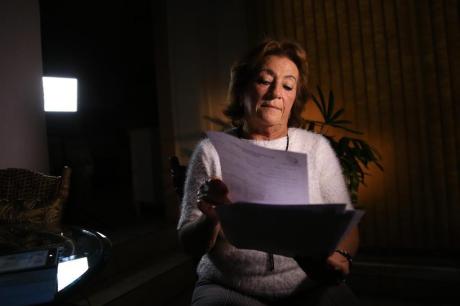Protected by the low supervision capacities of the National Social Security Institute (INSS), financial institutions make new victims every day.
Retirees in Brazil are suffering monthly unauthorised discounts that appear in their paychecks as insurances that they had never hired.
Two of the main beneficiaries of the allowances on salaries are the Sabemi Group, which operates in the insurance business and payroll loans and is headquartered in Porto Alegre, and the National Retirees and Pensioners Central (Centrape).
Both institutions are a target for at least 1,100 complaints on the Reclame Aqui website for improper charges.
The Federal Police opened an inquiry in April to investigate these irregularities. The Superintendence of Private Insurance (Susep) reported that it is in the second inspection process against Sabemi.
The first was in 2017 and resulted in fines. The most recent, from 2018, is at its final phase and could lead to the suspension of product operation.
Celi Scursel, 71 , is one of the victims. A resident at the Vila Nova neighbourhood, in Porto Alegre, the INSS retiree found out that she was linked to Centrape when the institution had already made 16 withholdings in her salary from February 2018 to May 2019, the period during which they took R$612 (US$149.96) from her. The instalments started at R$30 (US$7.35) and now are at R$52 (US$12.74).
“I never signed an insurance contract, I didn’t authorise anything at all. I don’t know how they got my data, but I will fight for compensation”says Celi, who moonlights as an elderly caregiver to supplement her monthly income.
For weeks, the RBS Investigation Group (GDI) infiltrated six WhatsApp groups composed of financial brokers and gained access to representatives, account executives and Sabemi software where the insurance proposals are registered.
Soon, it was possible to prove that part of the products supposedly hired by retirees was rigged by forging their signatures.
In the business, the blow is called an auto-pilot, which consists of using documentation of files to insert the insurance collection in people’s accounts. The report was also presented on Sep 15, 2018 at Fantástico, on RBS TV.
Retired farmer Alvaro Machado Noveli, 77 years old, was also a victim of signature forgery.

For about one year, the resident of Rincão do Cristovão Pereira, who receives a minimum wage from INSS, had discounted monthly payments of R$ 18.74 which went to Centrape. The discovery only was made because Noveli’s stepson once needed to take the paychecks to the bank.
To this day I don’t know what Centrape is, said Noveli.
He filed a lawsuit to recover the discounted values and claim moral damage. In this case, Centrape defended itself by presenting the associate’s form of adhesion, with the supposed signature by Noveli. The judge was asked for graphoscope expertise.
The report was emphatic in stating that the signature was false. The real one is shaky, while the document from Centrape featured lettering that was rounded and cursive.
“The alleged signature inserted in the document which led to discounts in favour of defendant was falsified. (…)
Unfortunately, it is not uncommon to see, nowadays, gangs specialising in jeopardising naive people of low income by using expedients as the designed in the present case”, has stated, during trial, Judge Rogério Kotlinsky Renner.
The lawsuit has already been appealed in the second instance and Centrape’s condemnation and the indemnity to Noveli have been maintained.
JUDICIAL CASES REPEAT ACROSS THE COUNTRY
In the rest of the country, there are similar cases against Centrape and Sabemi, brought by retirees who claim to have never authorised discounts.
In Campo Grande (MS), Ilto Rosa Delgado, 69 years old, is trying to recover R$525 which Centrape withheld from his salary. At the request of the report, graphoscope and document scope expert João Henrique Saibel Rodrigues analysed Delgado’s alleged signature in a membership proposal:
Celi , who suffered 16 retentions on her salary totaling R$612, has been trying to claim her these benefits.
“It’s a crudely forged signature, which used a model not in use by the person anymore, probably from some old document.”
There are cases in which it takes time for the elderly to realise the monthly retention and, when that happens, they are directed to call centre units. Meanwhile, agents, representatives, and companies accumulate resources.
Both Sabemi and Centrape said they do not condone any kind of fraud.
“IF YOU HAVE A R$ 20,000 PER MONTH CUSTOMER PORTFOLIO, YOU’LL JUST BE HOME LYING DOWN”
Insurances for retirees, in this specific case, are payroll loan ramifications, in which the payment parcels are withheld on the paycheck. Finance companies hold large document file volumes accumulated over years of lending, plus other data banks, which are sold in brokers’ WhatsApp groups.
The portfolios include personal information and copies of the general register (RG) or the National Driver’s License (CNH). With this set, representatives who adhered to the practices make retirees’ data entry in banking software in the so-called autopilot (use of documents from files to include the insurance billing in the account without the person knowing).
Then comes the most important step: the so-called formalisation, at which time the signature is falsified. The systems of the institutions are partnered with major banks or directly with the INSS, which allows them to transmit electronically the fraudulent insurance membership. After receiving the data, the INSS digitally stamps the monthly discount on the paycheck of the retiree.
The step-by-step instructions were taught and narrated to the reporting team by several artificers of this business.
One of them is Alessy de Almeida Cardoso, owner of Alupe Promotora, in Teresina (PI). Using staff skilled in signature forgery, Alessy’s company makes insurance for retirees on autopilot.
While in contact with the reporting team, who posed as potential clients, Alessy used Armais Promotora, his brother Rodrigo Silva Cardoso’s company, to register a GDI reporter as an agent, with authorisation to log in and use the password to access Sabemi’s system, where elderly data is included to forge product hiring. Armais is Sabemi’s representative in the Northeast. In the conversation, Alessy explained the reason for betting on insurance:
“The payroll is a little tricky, sometimes you earn and sometimes you lose. There’s contestation, there’s fraud. Today, I focus more on insurance. It’s profitable, it will give you security. By the end of the year, if you have a client portfolio of R$20,000 per month, you will stay at home just lying down, you won’t need to sell anymore.”
A COURSE ON HOW TO FALSIFY DOCUMENTS GIVEN BY WHATSAPP
The advantage of insurance is that, once included in the pensioner’s paycheck, it will generate commission payment to the agent, to the representative accredited and to the bank every month.
This will only stop when those jeopardised get rid of the charge or when they die. Therefore, the insurance portfolios are cumulative and generate perennial money.
“What if you have any problems? It won’t come to anything. From the moment someone gives a complaint, Sabemi has a retention table, a call centre that will show the benefits (of insurance, such as prize draws and discounts at pharmacies).
From every 10 calls they receive there, only one cancels. I’m typing out one thing without the consent of the customer, but Sabemi says the responsibility is theirs,” narrated Alessy de Almeida Cardoso, owner of Alupe Promotora, in Teresina, Piauí.
“I, as an executive, can never endorse it. But that it makes money, it does. And a lot. Some people earn R$300,000 per month. Has anyone been arrested? Never,”
Over the phone, he introduced an employee from Alupe named Caio, responsible for teaching typing shortcuts and falsification.
The employee demonstrated over Whatsapp how a forged signature could be covered up with the help of a light bulb.
INSURANCE BENEFITS REMAIN IN A PROMISE ALONE
Sabemi Seguradora’s strategy, as revealed by their account executives and representatives, includes the presentation of supposed advantages guaranteed to retirees who discover they have become partners of the Brazilian National Retirees and Pensioners Central (Centrape).
The RBS Investigation Group (GDI) found that part of the alleged benefits, highlighted in Centrape advertisement and by Sabemi employees are difficult to access and are targeted for cancellations, such as the monthly draw of R$20,000 in the title of capitalisation and the drugstore discount.
Celi , who suffered 16 retentions on her salary totaling R$612, has been trying to claim her these benefits.
In one of several different incidents, the 71-year-old INSS retiree tried to use the benefit of technical assistance to fix her fridge. She was then told that the cost of the parts would be borne by the retiree. However, the technician that was scheduled to visit her house never showed up.
INSTRUCTIONS TO OVERLOOK FORGERY
January 2018 audio recordings by a former employee from the Pampa Insurance Club, in downtown Porto Alegre, reinforce the evidence that Centrape is a Sabemi product.
Two conversations were captured at meetings of supervisors of the Pampa Club with staff responsible for insurance typing. At that time, the Pampa Club was Sabemi’s representative in Rio Grande do Sul, with 65,000 completed sales, according to information provided by supervisors during the meeting.
A Sabemi envoy was also present in the discussion, in which Pampa Club staff were ordered to overlook forgery of signatures, which were generating many “refusals”, occasions in which the business is stalled by technical problems.
“First of all, guys, the number of declines. We have to take our foot off the brake. Let’s be honest, we work with a photocopy machine. There is a lot that we accept, and we know that it is not really the customer. But it is our reality. Nobody here is a child,” said the then supervisor of Pampa Club identified as Marcia Cristina.
In a note, Sabemi reported that it promoted the discrediting of Pampa Club.
EMPLOYEES CONFIRM EXISTENCE OF FRAUD
The reporting team contacted a Sabemi’s account executive and went to the headquarters of Sabemi financial institution in the historic centre of Porto Alegre, for an alleged business meeting. In the conversation, the official said that, currently, insurance accounts represent 70 per cent of the company revenue. Not knowing he was being recorded, the executive confirmed the existence of fraud.
The team also spoke to a Sabemi account executive located in the São Paulo countryside – the institution currently has 38 branches in 23 states. The scams would run trivially in the market, so she knew how to detail even the salaries of some representatives.
“I, as an executive, can never endorse it. But that it makes money, it does. And a lot. Some people earn R$300,000 per month. Has anyone been arrested? Never,” said the executive.
REPERCUSSIONS OF THE REPORT
The impact of the report was seismic. Sabemi Insurance announced that it would return the money to the elders who were jeopardised.
It also said they would cease to operate in the field of associative insurance, the mode in which fraud occurred. Centrape, Sabemi’s business partner, also announced that it would end their search for associates.
The INSS suspended transfers of discounted amounts from senior paychecks to Centrape as membership fees. Due to the fraud, the INSS understood that Centrape should no longer be remunerated.
Procon-RS and the Public Defender’s Office opened special committees to check if Sabemi would properly compensate the jeopardised elderly.
The Superintendence of Private Insurance (Susep) suspended for 30 days the financial assistance operations of Sabemi, a byproduct of insurance. Susep has opened a new administrative investigation to investigate Sabemi’s conduct.
This story by Carlos Rollsing, Jonas Campos and Aline Rodrigues was originally published on Sep 16, 2018 by Zero Hora.
To investigate payroll insurance and payroll loans, Zero Hora reporter Carlos Rollsing, in a partnership with RBS TV’s Jonas Campos, spoke to victims and infiltrated scammers’ WhatsApp groups. It took around 50 days’ worth of research. From the telephone contacts, the reporting team approached bank correspondents and insurance representatives from around the country who specialised in gathering retiree documents and falsifying their signatures to divert a part of their paycheck to the National Retirees and Pensioners Central (Centrape). The elderly victims had no idea what Centrape was, but, every month, they were unwittingly enriching these professional scammers.




